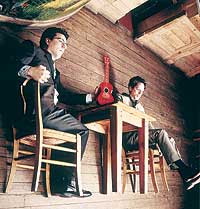Construction linked with banks failed due to loss of credit and bankruptcy, leading to the building of Hoovervilles. Shanty houses were the usual living place for most Americans during the Great Depression. Hoovervilles is a more common name. Jobless people relied on the kind deeds of others for basic necessities such as milk and bread. Hoover believed that it was the job of good citizens to help the poor, not the government's. Soup kitchen's were the main dining place for Americans. The middle class was non existent, ranging from the extrememly poor to the extrememly rich. A man's day conisted of searching for a job, and when the search ended with no results, he felt it as a personal failure for his joblessness. Women even went on the hunt for jobs, despite how they were viewed. People had to sell usually expensive goods for significant less amounts. Even families' children were needed for labor. Miniorities, such as African Americans were negatively impacted even more so than whites. White men demanded that African Americans were forced out of their jobs untill, "every white man had a job". In such an economic depression, entertainment was valued. Radio and movie theaters provided a source of relief after a long day of hardships. Entertainment was the only enjoyable thing for people of the Great Depression.
Monday, February 23, 2009
Life in the Great Depression
Construction linked with banks failed due to loss of credit and bankruptcy, leading to the building of Hoovervilles. Shanty houses were the usual living place for most Americans during the Great Depression. Hoovervilles is a more common name. Jobless people relied on the kind deeds of others for basic necessities such as milk and bread. Hoover believed that it was the job of good citizens to help the poor, not the government's. Soup kitchen's were the main dining place for Americans. The middle class was non existent, ranging from the extrememly poor to the extrememly rich. A man's day conisted of searching for a job, and when the search ended with no results, he felt it as a personal failure for his joblessness. Women even went on the hunt for jobs, despite how they were viewed. People had to sell usually expensive goods for significant less amounts. Even families' children were needed for labor. Miniorities, such as African Americans were negatively impacted even more so than whites. White men demanded that African Americans were forced out of their jobs untill, "every white man had a job". In such an economic depression, entertainment was valued. Radio and movie theaters provided a source of relief after a long day of hardships. Entertainment was the only enjoyable thing for people of the Great Depression.
Credit in the Great Depression
The Great Depression's most impactful cause was that of credit. In the roaring 20's money was not used to pay for things. Credit was. When it came time to pay for products obtained through credit, the people could not. This lead to a national debt, as banks ran out of money. Banks had given out risky loans based on credit. When people could not pay back these loans, banks were forced to decalre bankruptcy. When news of banks closing and not having enough money spred, a nation wide panic occured, where people quickly tried to withdraw everything in their savings account. When banks could not give everyone their money, due to extreme withdraws of other members, people were left with nothing. Credit was over used in the 20's leading to the depression through the 30's. Such credit failures are still present today. Banks in the 21st century have given out risky loans to people who can not pay back the credit they have recieved. This is proven in the housing market and increasing forclosure. Credit still impacts the economy now, as it had eighty years ago. The nation is still in debt as a whole, and will be as long as their is credit.
Sunday, February 1, 2009
Carnegie Hall
Carnegie was an immigrant from Scotland, immigrating to America as a child. He was the builder of Pittsburgh's Carnegie Steel Company. With the excessive money he made from his steel businesses he founded educational ventures, such as Carnegie Endowment for International Peace and Carnegie Mellon University. Carnegie could have ran for Ms. America, considering how he donated most of his money to countries of the world, schools and libraries. As well as the steel industry, Carnegie had investments in the railroad system. The Sherman Antitrust did not really effect Carnegie, thus giving him the title of one of the richest men on Earth. He, however, did not get the bad reputation of most monopolistic men, as he donated much of what he earned.
Subscribe to:
Comments (Atom)
